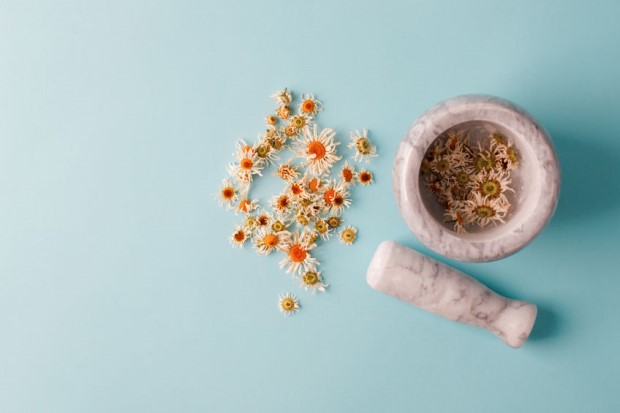
Medicinal garden teas are not just for drinking, they are also a powerful tonic for your hair. Botanicals are commonly used in commercial hair products for their benefits and aromas. Why not create your own experience at home with your medicinal garden plants?
Whether you have trouble with dandruff or just want some extra shine, there’s a hair tea that may be a great help in supporting your needs. In this article, I share strategies to creating your own medicinal hair teas and other tips.
MEDICINAL HAIR TEA INSTRUCTIONS:
- To create medicinal hair teas, use one-half cup of fresh herbs per two cups of water. If you have short to medium length hair, two cups of hair tea are plenty. If you have long hair, you may want to brew a total of four cups.
- First, using a tea kettle (or small saucepan), bring water to a boil. Remove from heat. Add fresh herbs to boiling water. Steep for one hour.
- After one hour, strain herbs from water and discard herbs. Pour hair tea into a shatter-proof cup or any other vessel that will be safe to use in your bathroom or shower.
- Wash and rinse hair per your normal routine but skip the use of your conditioner.
- After washing your hair, slowly pour hair tea over hair and scalp, gently massaging it in with your fingertips.
- Note: As with any hair product, avoid contact with your eyes and other sensitive body parts. If it gets in or near your eyes, flush with water immediately.
- After rinsing your hair with hair tea, leave the tea residue in your hair—do not rinse it out with water. If you’re showering, rather than washing your hair, you will want to rinse your body to remove any tea residue.
- Towel dry hair. If preferred, you may spray your hair with a leave-in conditioner or use a hair oil after drying. Proceed to style your hair as you normally would.
Hair teas may be used once per week (or more often), depending upon your personal preferences and needs. You should notice subtle effects immediately after your first use of a hair tea. Over time, the effects tend to have a cumulative effect. Using chamomile hair tea on blond hair, for example, should help brighten the hair and add a little shine after the first use. Over time, you may notice some lightening of the hair color. If you feel you’ve reached an optimal stage for your hair color and brightness, discontinue the hair tea use from your routine for a while, and then add it back in when you feel your hair needs some extra pep.
You may also choose to switch hair teas. If you find that your blond hair is lightening from regular chamomile tea use, but all you want is some shine to your hair, stop using the chamomile hair tea in your routine and brew some lavender hair tea instead.
A GUIDE TO THE BEST HAIR TEA FOR YOUR HAIR NEEDS:
- Blond hair—brew chamomile hair tea
- Brown hair—brew rosemary hair tea
- Dark hair—brew sage hair tea
- Red hair—brew calendula flower hair tea
- Oily hair—brew lemongrass hair tea OR brew thyme hair tea
- Dandruff—brew bay leaf hair tea
- Split ends—brew catnip hair tea
- To add shine to any color hair—brew lavender hair tea OR brew basil hair tea
There’s no tried-and-true solution for gray hair, but you may find that chamomile hair tea (for light gray or white hair) or sage hair tea (for dark gray hair) have desirable effects in helping to even out hair tones. Lavender hair tea is a lovely option for all shades of gray hair, as it will add shine and luster.
For each shampoo session, use only one hair tea. If you have multiple hair needs, alternate use of hair teas throughout the week.
For example: If you have blond hair and dandruff issues, use a chamomile hair tea the first time you wash your hair during the week and a bay leaf hair tea the next time you wash your hair that week.
Use apple cider vinegar for hair as a bonus boost, especially when dandruff is one of your common hair issues. Once per week, prior to using your hair tea, rinse hair with one cup of apple cider vinegar first.
Looking for an all-natural conditioner to pamper your locks a little more? A combination of hempseed oil and rose water is a refreshing treat for every hair type.
ROSE WATER HEMPSEED OIL CONDITIONER:
- 1/2 cup of rose water (see recipe in Chapter 8)
- 1/4 cup of hempseed oil
Whisk rose water and hempseed oil together. After shampooing your hair, massage rose water hempseed oil conditioner into hair and scalp. Continue massaging hair, using your fingertips to ensure all hair strands are coated.
Leave rose water hempseed oil conditioner on for five minutes and then rinse out. If you have extremely dry hair, don’t rinse the mixture out. Leave it in for extra conditioning.
Dry and style hair per your normal routine.
HERBAL FACIAL TREATMENT:
Medicinal hair teas can also be used as an herbal facial treatment. Use the herb that supports the result you desire.
– Rose petals hydrate dry skin.
– Chamomile and lavender are skin soothers.
– Peppermint can help detox and refresh.
– Parsley and lemongrass are natural astringents, good for balancing oily skin.
– Rosemary helps brighten all skin types.
(C) 2021.Reprinted with permission. An excerpt from Getting Baked: Everything You Need to Know about Hemp, CBD, and Medicinal Gardening by Barb Webb. Simon and Schuster.


